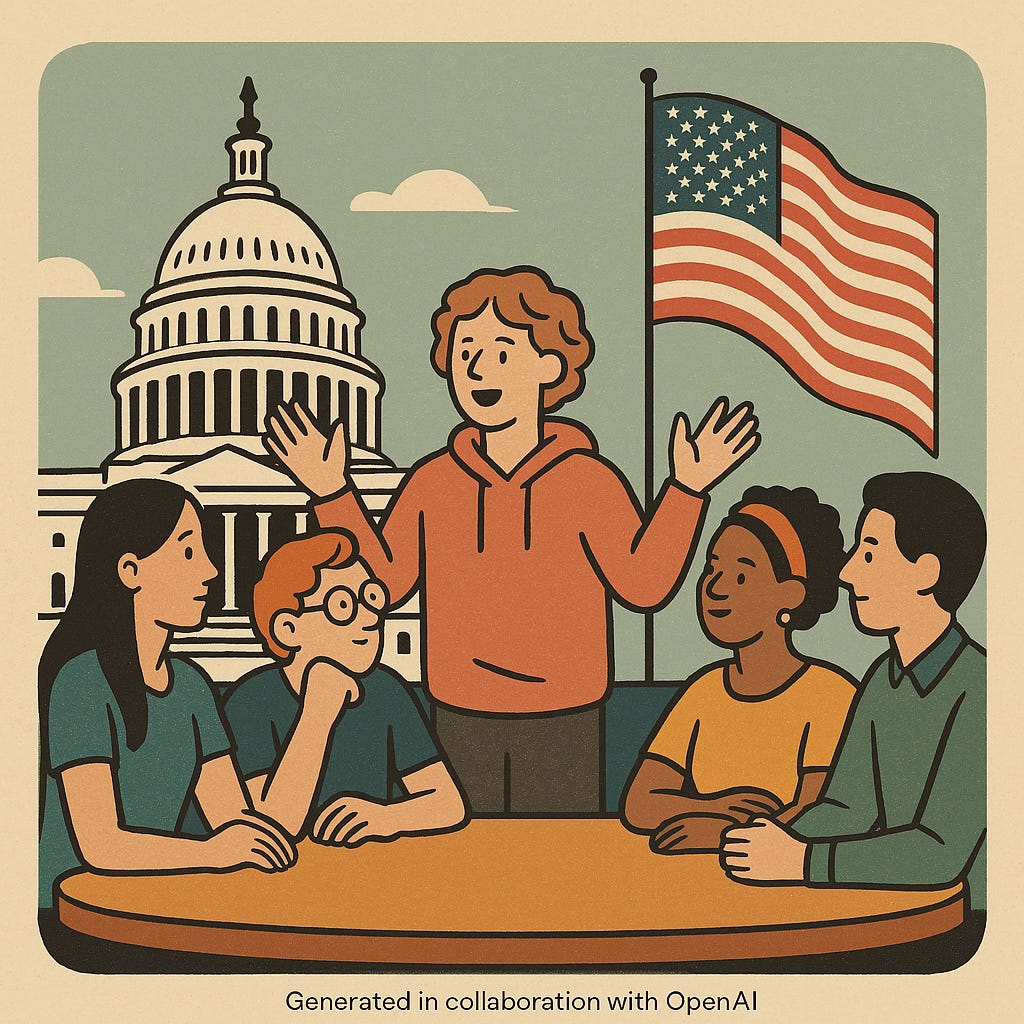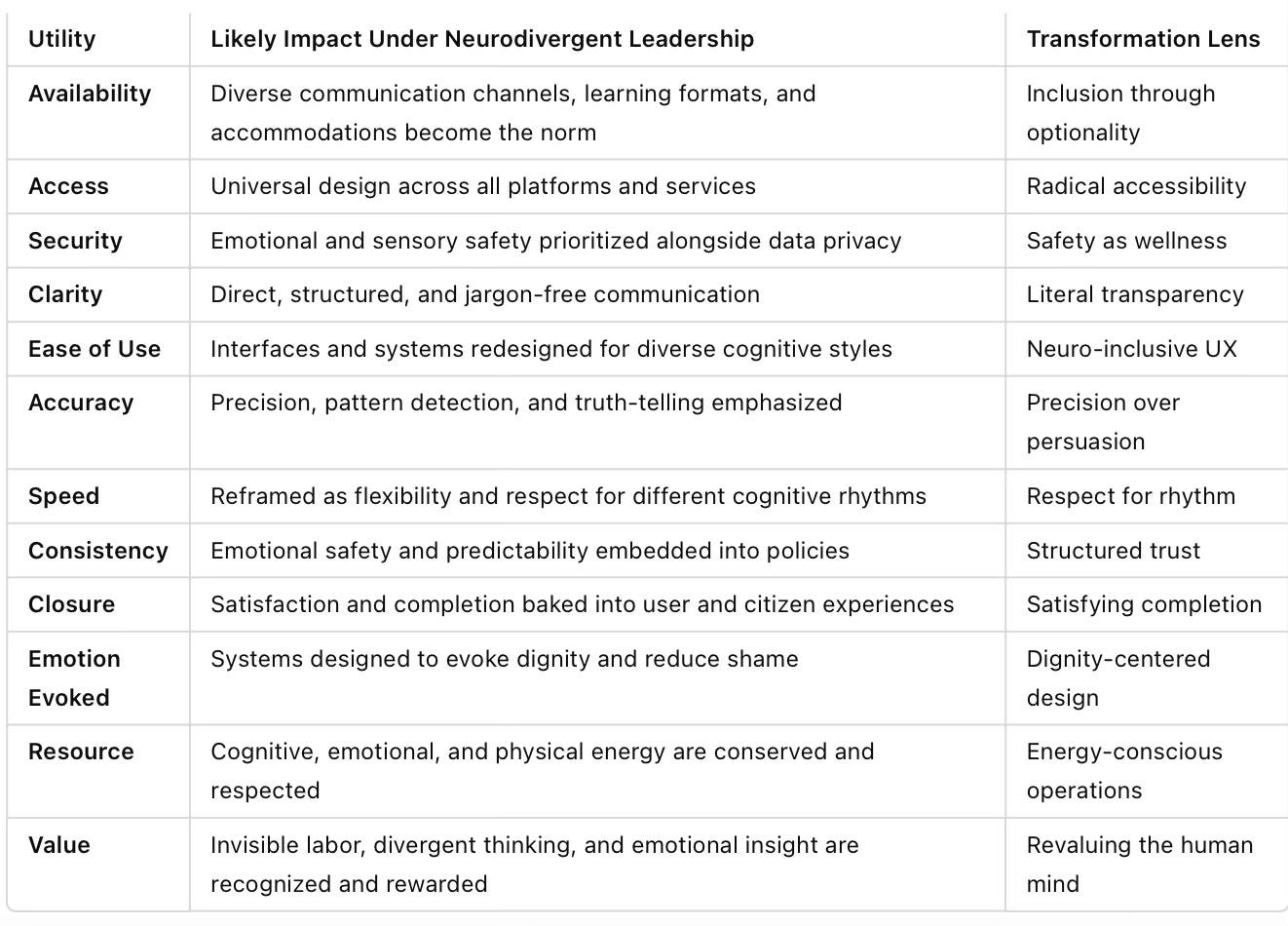From the THX Series Hub: Disability, Autism & THX and From the THX Series Hub: Neurodivergence & the Founding of a Nation
Listen to the podcast here
What if neurodivergent individuals led our government, designed our systems, and shaped our national values?
Let’s play with a radical idea: What if neurodivergent individuals led our government, designed our systems, and shaped our national values?
What would change? What would stay the same? And what would it mean for the human experience?
Through the lens of the 12 Utilities, Prospect Theory, the Admiration Equation, and PERMAH, let’s imagine a world governed by the beautiful complexity of minds that experience the world differently.
A Quick Intro to the 12 Utilities
In customer experience (CX) and transformation work, people evaluate their interactions through 12 types of perceived value—called Utilities. Each one shapes how we judge whether an experience is good, bad, or transformative. They are:
Availability: Can I get what I need, when I need it?
Access: Is it easy and convenient for me to engage?
Security: Do I feel safe—physically, digitally, emotionally?
Clarity: Do I understand what’s happening and what’s expected?
Ease of Use: Is the experience intuitive or frustrating?
Accuracy: Is the information or outcome correct and reliable?
Speed: How quickly do things happen?
Consistency: Are things stable and predictable?
Closure: Do I feel things are resolved and complete?
Emotion Evoked: How does this make me feel?
Resource Utility: Does it save or waste my time, money, energy?
Value Utility: What’s the deeper worth or significance of this experience?
These Utilities help us map the real human impact of systems, services, and leadership.
Governance Reimagined: Neurodivergent Leadership in Power
1. Policy-Making Would Prioritize Clarity, Access, and Emotion Evoked
Clarity: Straight talk, fewer euphemisms, and more literal, transparent communication. Policies wouldn’t be hidden in bureaucratic fog.
Access: Universal design wouldn’t be an afterthought—it would be baseline. Everything from voting to education would be reimagined for different processing needs.
Emotion Evoked: Policies would be shaped with heightened empathy and intense moral clarity. Fairness and inclusion would become emotional imperatives, not just theoretical ones.
2. Education Would Be Rewired for Neurodiversity (High Accuracy, Ease of Use, Closure)
Standardized testing? Drastically reformed or gone.
Learning differences would be understood as variations in brilliance, not deficiencies.
Students would leave school with a greater sense of Closure: the satisfaction of being seen, understood, and successful on their own terms.
3. Time Would Be Revalued (Speed vs. Consistency)
Systems might value rhythmic bursts of productivity and intentional rest, rather than constant output.
Consistency would reflect emotional safety and structure rather than rigidity.
⚖️ Prospect Theory Rewired
Loss aversion might focus less on financial risk and more on social harm, exclusion, or sensory overwhelm.
Gains would be evaluated by meaning, connection, and authenticity—not just metrics or money.
PERMAH-Driven National Priorities

Admiration Equation in Action
Policies and leaders would inspire admiration through:
Goodness: Universal services delivered with compassion
Skill: Deep listening and systems thinking
Awe: Breakthroughs in sustainability, design, and justice
Gratitude: A society that thanks its leaders for making room for all minds
The Admiration Equation is a concept that explores how people come to admire others or systems—based on perceived goodness, skill, awe, and gratitude. When experiences exceed expectations and evoke these feelings, they spark not only admiration but a desire to reciprocate, do good, and become better. It’s admiration as a catalyst for transformation.
The 12 Utilities Reimagined
What Might Stay the Same (or Become More Understood)
Ambition: It would still exist, but shift toward purpose and personal mastery over competition.
Conflict: Still present, but likely addressed more directly and systemically.
Capitalism: Might remain, but with a radically redefined sense of value.
What kind of world would emerge if our leaders thought differently—literally?
If you identify as neurodivergent, what values or practices would you bring to the table?
If you’re neurotypical, which ideas here excite or challenge your view of what leadership should look like?
Let’s build a more inclusive, awe-filled, and human-centered future—together.

Interpretation:
This image reflects the heart of the post—what governing might look like if led by minds that process differently. Instead of dominance or hierarchy, we see shared focus, deep listening, and expressive inclusion. The Capitol and flag root the scene in tradition, but the warm tones and open gestures hint at transformation: a system not just for the people, but by all kinds of people.




